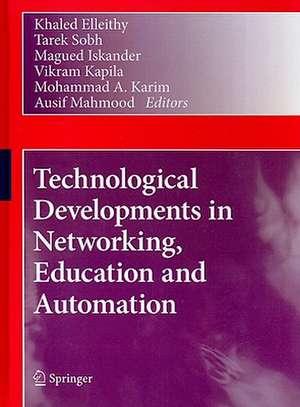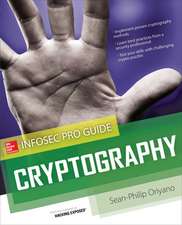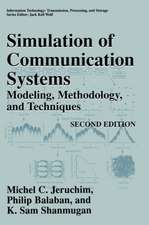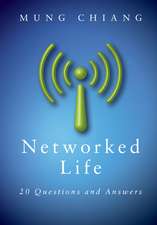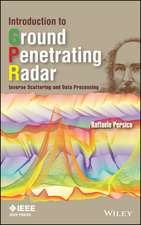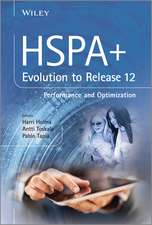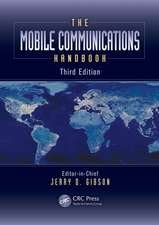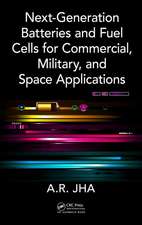Technological Developments in Networking, Education and Automation
Editat de Khaled Elleithy, Tarek Sobh, Magued Iskander, Vikram Kapila, Mohammad A. Karim, Ausif Mahmooden Limba Engleză Hardback – 21 iul 2010
Computer Networks: Access Technologies, Medium Access Control, Network architectures and Equipment, Optical Networks and Switching, Telecommunication Technology, and Ultra Wideband Communications.
Engineering Education and Online Learning: including development of courses and systems for engineering, technical and liberal studies programs; online laboratories; intelligent testing using fuzzy logic; taxonomy of e-courses; and evaluation of online courses.
Pedagogy: including benchmarking; group-learning; active learning; teaching of multiple subjects together; ontology; and knowledge management.
Instruction Technology: including internet textbooks; virtual reality labs, instructional design, virtual models, pedagogy-oriented markup languages; graphic design possibilities; open source classroom management software; automatic email response systems; tablet-pcs; personalization using web mining technology; intelligent digital chalkboards; virtual room concepts for cooperative scientific work; and network technologies, management, and architecture.
Coding and Modulation: Modeling and Simulation, OFDM technology , Space-time Coding, Spread Spectrum and CDMA Systems.
Wireless technologies: Bluetooth , Cellular Wireless Networks, Cordless Systems and Wireless Local Loop, HIPERLAN, IEEE 802.11, Mobile Network Layer, Mobile Transport Layer, and Spread Spectrum.
Network Security and applications: Authentication Applications, Block Ciphers Design Principles, Block Ciphers Modes of Operation, Electronic Mail Security, Encryption & Message Confidentiality, Firewalls, IP Security, Key Cryptography & Message Authentication, and Web Security.
Robotics, Control Systems and Automation: Distributed Control Systems, Automation, Expert Systems, Robotics, Factory Automation, Intelligent Control Systems, Man Machine Interaction, Manufacturing Information System, Motion Control, and Process Automation.
Vision Systems: for human action sensing, face recognition, and image processing algorithms for smoothing of high speed motion.
Electronics and Power Systems: Actuators, Electro-Mechanical Systems, High Frequency Converters, Industrial Electronics, Motors and Drives, Power Converters, Power Devices and Components, and Power Electronics.
| Toate formatele și edițiile | Preț | Express |
|---|---|---|
| Paperback (1) | 1093.24 lei 38-44 zile | |
| SPRINGER NETHERLANDS – 25 noi 2014 | 1093.24 lei 38-44 zile | |
| Hardback (1) | 1100.18 lei 38-44 zile | |
| SPRINGER NETHERLANDS – 21 iul 2010 | 1100.18 lei 38-44 zile |
Preț: 1100.18 lei
Preț vechi: 1447.60 lei
-24% Nou
Puncte Express: 1650
Preț estimativ în valută:
210.55€ • 219.00$ • 173.82£
210.55€ • 219.00$ • 173.82£
Carte tipărită la comandă
Livrare economică 11-17 aprilie
Preluare comenzi: 021 569.72.76
Specificații
ISBN-13: 9789048191505
ISBN-10: 9048191505
Pagini: 500
Ilustrații: XIX, 643 p.
Dimensiuni: 193 x 260 x 43 mm
Greutate: 1.5 kg
Ediția:2010
Editura: SPRINGER NETHERLANDS
Colecția Springer
Locul publicării:Dordrecht, Netherlands
ISBN-10: 9048191505
Pagini: 500
Ilustrații: XIX, 643 p.
Dimensiuni: 193 x 260 x 43 mm
Greutate: 1.5 kg
Ediția:2010
Editura: SPRINGER NETHERLANDS
Colecția Springer
Locul publicării:Dordrecht, Netherlands
Public țintă
ResearchCuprins
Education in the Clouds: How Colleges and Universities are Leveraging Cloud Computing.- Weak Orderings of Knowledge States.- Problem Based Learning: Obtaining Enzyme Kinetics Parameters Integrating Linear Algebra, Computer Programming and Biochemistry Curriculum.- Adaptive Assessments using Open Standards.- Online Academic Advising Support.- Using Computer Game to Share knowledge.- Following the Paper Trail: Measuring the Economic and Environmental Impact of Digital Content Delivery.- Context Driven Personalized e-Learning Environment Provided as a State Service.- Exploring Teachers’ Beliefs about Digital Citizenship and Responsibility.- Faculty Driven Assessment of Critical Thinking: National Dissemination of the CAT Instrument.- Enhancing the Instruction of Introductory Electric Circuit Courses using MATLAB.- Istopolis: Design Issues and Evaluation’ Results of an Integrated Web-Based Educational Application.- TEAC2H-RI: Educational Robotic Platform for Improving Teaching-Learning Processes of Technology in Developing Countries.- Selecting Patterns for the Evaluation of Systems.- Effectiveness of Collaborative Learning in Teaching Information Systems.- Implementation of a Curriculum Management System at a Faculty of Medicine – Lessons Learned from a Pilot Project.- Use of Ontology for Reusing Web Repositories for eLearning.- Actual and Future Trends of the E-education and Its Costs Specification in the Czech Republic.- Modern Improvements in the Digital Logic Laboratory.- e-Cheating and Calculator-Technology.- Perspectives on Critical Thinking through Online Discussion Forums in Engineering Mathematics.- Digital System Description Knowledge Assessment.- Wikibooks as Tools for Promoting Constructivist Learning in Higher Education: Findings from a Case Study.- TheImpact of the Context of an Information System on Strategic Information Quality - The Institute of Technology Sector in Ireland.- Can Mobile Computing Help Reverse the Decline in Informatics Studies?.- Towards an Academic Social Network for Bologna Process.- Supporting knowledge Discovery in an eLearning Environment Having Social Components.- Computer Numerical Control, Mass Customization and Architectural Education in an Emergent Economy.- Application of Project Based Study in the Learning Process: A Case Study.- Interdisciplinary Automation and Control in a Programmable Logic Controller (PLC) Laboratory.- Stereo Spectral Imaging System for Plant Health Characterization.- Transition Network for Automation Modeling: A Case Study.- Computational Modeling and Simulation of a New Energy-Saving Sealing Unit in Industrial Applications.- Design of An Intelligent Solar Tracking System Using PIC18F452 Micro Controller.- Adaptive Two Layers Neural Network Frequency Controller for Isolated Thermal Power System.- Optimal Controller Comparison Using Pareto Fronts.- Interaction with Objects in Virtual Environments.- One Approach for Training of Recurrent Neural Network Model of IIR Digital Filter.- Classification of the Power Transformers using Dissolved Gas Analysis.- Modelling Control of Pore Number and Radii Distribution in Single-Cell Electroporation.- Single Allocation P-Hub Median Problem to Monitor Land Borders by Using Unmanned Aircraft.- LPT to RS232 communication converter.- Simulation Model of Coremaking Plant.- Depth Calculation using Computer Vision and Sift.- Dynamic of New Technologies in Switching Power Devices IGBTs.- Anisotropic Percolating Pathways in the Thin Films of Polymeric PEDT/PSS Complex and their Relation to the Electrical Conductivity as Revealed by theMesoscale Simulation.- Predicting Trading Signals of Sri Lankan Stock Market Using Genetic Algorithms and Neural Networks.- An Automatic Measurement Algorithm for the Diameters of Carbon Nanotubes by Using Image Processing.- Object Detection in Foveated Images.- Digital Semi-Controlled Rectifier using a Microcontroller.- Generalized Minimum Variance Controller with Dynamic Pole Assignment to Improve Performance in Industrial Applications.- Automated Detection of Sunspots and Sunspot Groups in Full-Disk Solar Images.- Stochastic Model Based Approach for Biometric Identification.- A New Stochastic Model Based Approach for Object Identification and Segmentation in Textured Color Image.- An Unsupervised Stochastic Model for Detection and Identification of Objects in Textured Color Images Using Segmentation Technique.- Automated Classification of Sunspot Groups with Support Vector Machines.- A Novel Ballistics Imaging System for Firearm Identification.- Color Seal Segmentation and Identification.- Efficient SOPC-Based Multicore System Design using NOC.- Architecture and Initial Performance Indicators of New OPCUA Automation Protocol Stack Java Implementation.- Automatic Segmentation of Cardiac Cavity Images Using Collinear and Triangle Equation.- Both Side More-Output Transmission with Harmonic Gear.- Intelligent Plasma Monitoring Systems Based on Optical Methods and Chromatic Modulation.- A Neoteric Chaotic & Adaptive Watermarking Scheme for Colored Images.- Rotary Transducer.- Regression Analysis about Humidity Elimination from Diesel Fuel Via Bioorganic Compounds to Increase Antifouling Action.- Optimal Threshold for Locating Targets Within a Surveillance Region Using a Binary Sensor Network.- A Proposal of a Nonlinear Observer Applied to the Heat Exchange Phenomenain a Double Pipe Heat Exchanger.- Vibration Signal Processing by Deconvolution Method.- An IT Change Management Tool to Optimize Scheduling and Planning.- A Low-Power Content-Addressable Memory (CAM) using Pipelined Search Scheme.- Design and Optimization of Piezoelectric Dual-Mode Micro-Mirror.- Device for Measurement of Clamped Joints Friction Torque.- Self-Optimization for Dynamic Scheduling in Manufacturing Systems.- A Decomposition Method in Modeling Queuing Systems.- Modular Design and Structure for a Mobile Sensory Platform.- wradvs: A Didactic Server for IPv6 Stateless Autoconfiguration.- Securing P2P Wireless Communications by Deploying Honeytokens in a Cooperative Maritime Network.- Integrating Information Security into Quality Management Systems.- Evaluation of Asynchronous Event Mechanisms for Browser-based Real-time Communication Integration.- An Ontology-based Intrusion Detection for RFID Systems.- A New Algorithm and its Implementations for RC Filters.- A Computationally Dynamic Resource Management for Multicarrier Communications in Downlink for OFDMA Systems.- A General Method for Synthesis of Families of Orthogonal Complementary Codes.- E-Speed Start- A Window Based Additive Increase, Multiplicative Decrease Network Congestion Control Technique.- Common-Wavelengths Design Scheme for Efficient Management of Spare Resources in WDM Networks.- ICMP Covert Channel Resiliency.- Chip-to-chip Free-space Optical Interconnection Using Liquid-crystal-over-silicon Spatial light modulator.- GA based Neural Network Retraining using Adaptive Genetic Operations.- Decision Support for IP Uplink and Routing Choice.- Differential Cryptanalysis of Blow-CAST-Fish.- A Keyless Polyalphabetic Cipher.- Vertical Handover between WiFi Network and WiMAX Network According to IEEE 802.21 Standard.- Study on the Impact of Node Density and Sink Location in WSN.- An Algorithm for Synthesis of Families of Generalized Orthogonal Complementary Pairs.- Low Message Overhead Clustering Algorithm for Wireless Sensor Networks.- On the Design of SOHO Networks.- Study of UMTS Handover Scenarios.- Reduction of Energy Consumption in WSN using an Approach Geocast.- Conflicts in Online Social Network Privacy Policy.- Developing a Feedback Model for Managing Congestion in Packet Switched Wide Area Networks.- Voice Gateway to IP-PSTN Integration and NGN Architecture.- An Algorithm for Route Selection on Multi-sink Wireless Sensor Network Using Fuzzy Logic.- Mining Mobile Sequential Patterns in Wireless Cellular Networks.- Agile Software Development Methods and its Advantages.- Toward a High Performance Grid Site RO-14-ITIM and the Contribution to WLCG.- A MFI4OR-based Approach of Semantic Annotation for Web Service.- Ethernet Node for Serial Communications.- EvalTool for Evaluate the Partitioning Scheme of Distributed Databases.- Automatic Creation of Daily News Digests from Internet News Sites.
Textul de pe ultima copertă
Technological Developments in Networking, Education and Automation includes a set of rigorously reviewed world-class manuscripts addressing and detailing state-of-the-art research projects in the following areas:
Computer Networks: Access Technologies, Medium Access Control, Network architectures and Equipment, Optical Networks and Switching, Telecommunication Technology, and Ultra Wideband Communications.
Engineering Education and Online Learning: including development of courses and systems for engineering, technical and liberal studies programs; online laboratories; intelligent testing using fuzzy logic; taxonomy of e-courses; and evaluation of online courses.
Pedagogy: including benchmarking; group-learning; active learning; teaching of multiple subjects together; ontology; and knowledge management.
Instruction Technology: including internet textbooks; virtual reality labs, instructional design, virtual models, pedagogy-oriented markup languages; graphic design possibilities; open source classroom management software; automatic email response systems; tablet-pcs; personalization using web mining technology; intelligent digital chalkboards; virtual room concepts for cooperative scientific work; and network technologies, management, and architecture.
Coding and Modulation: Modeling and Simulation, OFDM technology , Space-time Coding, Spread Spectrum and CDMA Systems.
Wireless technologies: Bluetooth , Cellular Wireless Networks, Cordless Systems and Wireless Local Loop, HIPERLAN, IEEE 802.11, Mobile Network Layer, Mobile Transport Layer, and Spread Spectrum.
Network Security and applications: Authentication Applications, Block Ciphers Design Principles, Block Ciphers Modes of Operation, Electronic Mail Security, Encryption & Message Confidentiality, Firewalls, IP Security, Key Cryptography & Message Authentication, and Web Security.
Robotics, Control Systems and Automation: Distributed Control Systems, Automation, Expert Systems, Robotics, Factory Automation, Intelligent Control Systems, Man Machine Interaction, Manufacturing Information System, Motion Control, and Process Automation.
Vision Systems: for human action sensing, face recognition, and image processing algorithms for smoothing of high speed motion.
Electronics and Power Systems: Actuators, Electro-Mechanical Systems, High Frequency Converters, Industrial Electronics, Motors and Drives, Power Converters, Power Devices and Components, and Power Electronics.
Computer Networks: Access Technologies, Medium Access Control, Network architectures and Equipment, Optical Networks and Switching, Telecommunication Technology, and Ultra Wideband Communications.
Engineering Education and Online Learning: including development of courses and systems for engineering, technical and liberal studies programs; online laboratories; intelligent testing using fuzzy logic; taxonomy of e-courses; and evaluation of online courses.
Pedagogy: including benchmarking; group-learning; active learning; teaching of multiple subjects together; ontology; and knowledge management.
Instruction Technology: including internet textbooks; virtual reality labs, instructional design, virtual models, pedagogy-oriented markup languages; graphic design possibilities; open source classroom management software; automatic email response systems; tablet-pcs; personalization using web mining technology; intelligent digital chalkboards; virtual room concepts for cooperative scientific work; and network technologies, management, and architecture.
Coding and Modulation: Modeling and Simulation, OFDM technology , Space-time Coding, Spread Spectrum and CDMA Systems.
Wireless technologies: Bluetooth , Cellular Wireless Networks, Cordless Systems and Wireless Local Loop, HIPERLAN, IEEE 802.11, Mobile Network Layer, Mobile Transport Layer, and Spread Spectrum.
Network Security and applications: Authentication Applications, Block Ciphers Design Principles, Block Ciphers Modes of Operation, Electronic Mail Security, Encryption & Message Confidentiality, Firewalls, IP Security, Key Cryptography & Message Authentication, and Web Security.
Robotics, Control Systems and Automation: Distributed Control Systems, Automation, Expert Systems, Robotics, Factory Automation, Intelligent Control Systems, Man Machine Interaction, Manufacturing Information System, Motion Control, and Process Automation.
Vision Systems: for human action sensing, face recognition, and image processing algorithms for smoothing of high speed motion.
Electronics and Power Systems: Actuators, Electro-Mechanical Systems, High Frequency Converters, Industrial Electronics, Motors and Drives, Power Converters, Power Devices and Components, and Power Electronics.
Caracteristici
High-caliber research conference Each paper received at least two reviews Multi-discipline international contributions
